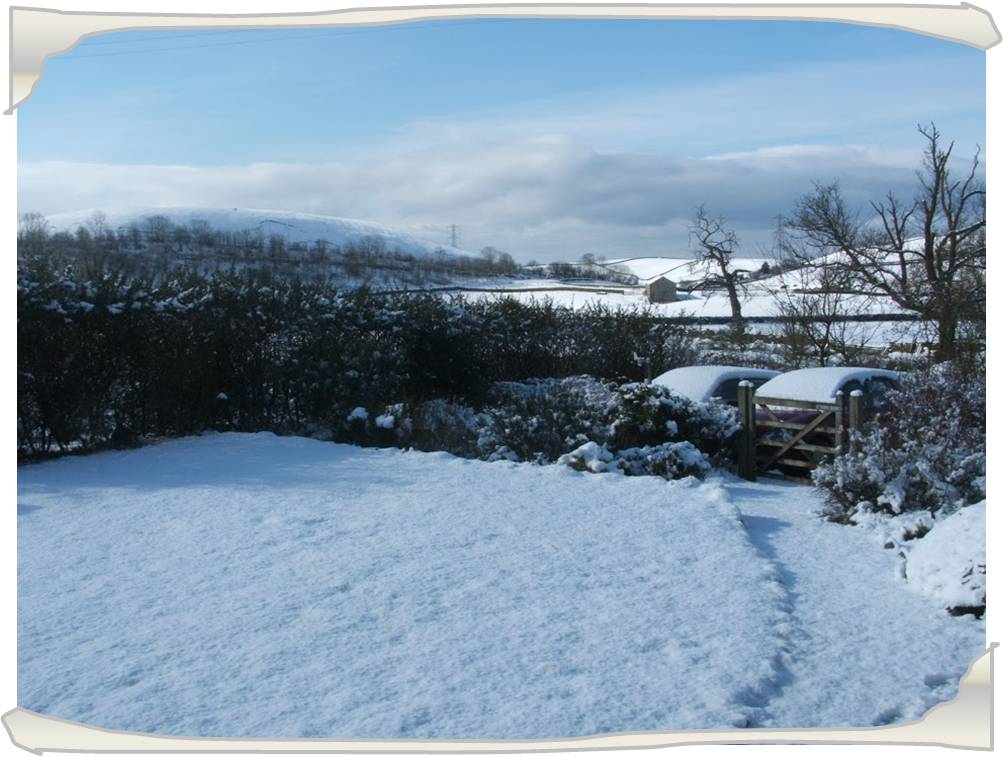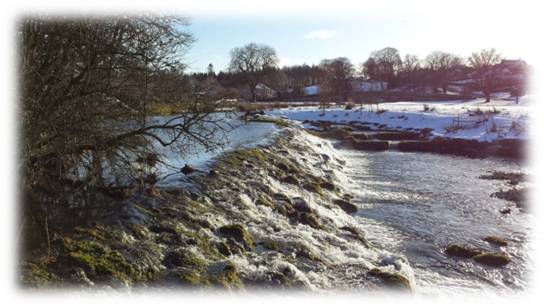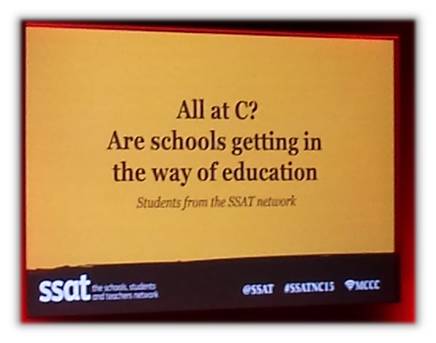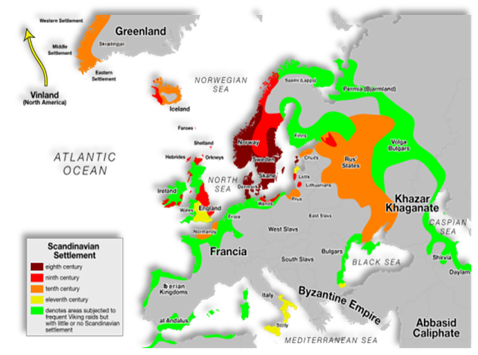
Prefer to read it on the train/over breakfast/in the bath? Download the 'proper' print-friendly PDF version here (also viewable on your Ipad)
CUREE ENEWS - Christmas 2015 Edition

Contents
- The Philippa Blog
- The Viking Guide to Knowledge Management
- The Ig Noble Awards
- CUREE's Christmas Quiz!
The Philippa Blog
Just been for my first walk in the snow for winter 2015. A week ago the village green was completely flooded, today all is calm peaceful and glistening. But we have been meeting friends from Kendal and Keswick where the clear up is going to take a lot more than a crystalline cover up. Very touched by the stories of community responsiveness; very conscious of the long hard haul back to homes that are clean, safe and dry...
The last few weeks of term have included a flurry of meetings and conferences. A high point was the student keynotes at the SSAT annual conference with their very sobering reminder to all of us about what it feels like to be on the other end of forensic target and data tracking for promoting success at GCSE. You can see here the presentation for the interactive session I ran with Anne Marie Duguid on Content knowledge and pedagogy - what comes first? This contains a tool I developed that people found useful for exploring the balance of priorities in their schools; there people told me they were talking it back to use with colleagues. If you are interested, the article for Schools week arising from it is here.

Everyone at CUREE joins me in wishing all of you and very happy Christmas, a great rest over the holiday period and a lively start to 2016.
Philippa Cordingley
The Viking Guide to Knowledge Management
For several centuries in the last millennium, the peoples of the countries bordering the Baltic and North Seas dominated first the region and subsequently much of the world. Vikings spread out from what we now call Scandinavia and raided and traded their way as far as Newfoundland (now Canada), Constantinople and islands in the Mediterranean (by which time they were known as Normans). During the ‘Viking Age’ this loose knit empire without an emperor included Scotland, Ireland and England and many of the coastal territories on the other shore. Then it all went a bit quiet for a few centuries until they snuck back onto the public stage with various gloomy portentous films, pale wood ‘modernist’ interior decoration, self-assembly furniture and a blend of all three in ‘scandi-noir’ detective fiction.
 You are by now thinking ‘what’s he on about and what can this have to do with education?’ And the answer is EPPIEE. Two weeks ago I had the opportunity to spend 24 hours in London with the European network formed by the participants in the EU-sponsored Evidence Informed Policy and Practice in Education in Europe project, which aimed to increase the use of evidence to inform decision-making in education policy and practice. The meeting was convened by Niels Rijke from the Netherlands and hosted by David Gough of UCL/Institute of Education. We had presentations from Lena Adamson from Sweden, Sølvi Lillejord from Norway and Stefan Denzler from Switzerland. Other participants were from Germany and Canada and the next event is due to be hosted in Denmark. You will by now have spotted that these countries are the very same ones (ahem – with the exception of Switzerland. And maybe the Netherlands) as participated in what we might now call the ‘European Viking Project’ 10 centuries ago.
You are by now thinking ‘what’s he on about and what can this have to do with education?’ And the answer is EPPIEE. Two weeks ago I had the opportunity to spend 24 hours in London with the European network formed by the participants in the EU-sponsored Evidence Informed Policy and Practice in Education in Europe project, which aimed to increase the use of evidence to inform decision-making in education policy and practice. The meeting was convened by Niels Rijke from the Netherlands and hosted by David Gough of UCL/Institute of Education. We had presentations from Lena Adamson from Sweden, Sølvi Lillejord from Norway and Stefan Denzler from Switzerland. Other participants were from Germany and Canada and the next event is due to be hosted in Denmark. You will by now have spotted that these countries are the very same ones (ahem – with the exception of Switzerland. And maybe the Netherlands) as participated in what we might now call the ‘European Viking Project’ 10 centuries ago.
So what is it about evidence informed policy and practice which brings these folk together in continued co-operation? Three things I suggest. First they share a common heritage of rationalist, vaguely Calvinist, philosophy that future action should be rooted in a dispassionate, logical analysis of the past. Secondly, these are people who are comfortable with the idea of shared, community resources – that pooling knowledge and understanding across Europe creates a whole greater than the sum of its parts. And thirdly [*chauvinism alert*], the EIPPEE participants are content – keen even – to conduct their exchanges in English.
There was, interestingly, a bit of a dividing line within the group (as well as a lot which bound us together). The English approach is very pragmatic and focussed on finding ways of putting important research evidence in the hands of policy makers and practitioners and we are willing to make compromises about simplifying the results to aid that process. This focus also informs the Scandinavian approach and various national knowledge centres exist or are being set up to provide a bridge between academic research and practice. Other countries (mention no names but think European mainland) are much more respectful of the academic amour propre.

The EPPIEE project website is updated periodically and includes a very useful search facility. Find it here. Members are commissioning and reporting on a number of substantial Systematic Reviews and these too will be referenced on the site (usually in an English version) so keep an eye open. Our European colleagues were kind enough to acknowledge England’s position in the vanguard of evidence informed policy and practice but they too are contributing resources of value to us. Watch out – the Vikings are coming again.
Paul Crisp
The Ig Nobel Awards
 With the end of the long Autumn Term fast approaching, and with it the holiday season, it can be tempting to let yourself get distracted from work occasionally. We at CUREE believe in indulging this temptation (though not to excess, of course) and to this end we would like to share with you the Ig Nobel Awards. Doing for research what Monty Python's Life of Brian did for religion, the Ig Nobel Awards celebrate some of the more esoteric research projects emerging from academia. In past years it has honoured such notable luminaries as Dr Elena Bodnar for the creation of a brassiere which can be quickly converted into a pair of protective face masks (2009), and the Japanese team who investigated the effect of listening to opera, on heart transplants who are mice (2013).
With the end of the long Autumn Term fast approaching, and with it the holiday season, it can be tempting to let yourself get distracted from work occasionally. We at CUREE believe in indulging this temptation (though not to excess, of course) and to this end we would like to share with you the Ig Nobel Awards. Doing for research what Monty Python's Life of Brian did for religion, the Ig Nobel Awards celebrate some of the more esoteric research projects emerging from academia. In past years it has honoured such notable luminaries as Dr Elena Bodnar for the creation of a brassiere which can be quickly converted into a pair of protective face masks (2009), and the Japanese team who investigated the effect of listening to opera, on heart transplants who are mice (2013).
This year's winners look set to join these lofty past figures, and we have included some of our favourites. The full list of winners can be found here.
Chemistry Prize - Callum Ormonde and Colin Raston (Australia), and Tom Yuan, Stephan Kudlacek, Sameeran Kunche, Joshua N. Smith, William A. Brown, Kaitlin Pugliese, Tivoli Olsen, Mariam Iftikhar and Gregory Weiss (USA) for inventing a chemical recipe to partially un-boil an egg.
Literature Prize - Mark Dingemanse (The Netherlands, USA), Francisco Torreira (The Netherlands, Belgium, USA) and Nick J. Enfield (The Netherlands, Australia) for discovering that the word 'huh?' or its equivalent seems to exist in every human language - and for not being quite sure why.
Mathematics Prize - Elisabeth Oberzaucher (Austria, Germany, UK) and Karl Grammer (Austria, Germany) for trying to use mathematical techniques to determine whether and how Moulay Ismael the Bloodthirsty, the Sharifian Emperor of Morocco, managed, during the years 1697 through 1727, to father 888 children.
Diagnostic Medicine Prize - Diallah Karim (Canada, UK), Anthony Harnden (New Zealand, UK, US), Nigel D'Souza (Bahrain, Belgium, Dubai, India, South Africa, US, UK), Andrew Huang (China, UK), Abdel Kader Allouni (Syria, UK), Helen Ashdown (UK), Richard J. Stevens (UK) and Simon Kreckler (UK) for determing that acute appendicitis can be accurately diagnosed by the amount of pain evident when the patient is driven over speed bumps.
Bart Crisp
CUREE's Christmas Quiz!
Get into the Christmas mood with this festive quiz by our own Maggie Stafford!
|
1) Christmas Island, in the Indian Ocean, is a territory of which country?
1) 'Three Kings Day' is known by what numerical name (that's 'name', not 'date') in Britain? 3) The North Pole, said to be Santa's home, is located in which ocean? 4) Marzipan is made (conventionally in the western world) mainly from sugar and the flour or meal of which nut? 5) Which Christmas condiment is made from fruit sometimes referred to as marshworts? 6) Which Christmas slogan was introduced by Clarissa Baldwin of Dogs Trust in 1978? 7) Who composed the music known as The Nutcracker Suite, for the Christmas themed ballet The Nutcracker, premiered in St Petersburg, 1892? 8) Which southern central US state, whose capital city has the same name, was the last to recognize Christmas as an official holiday? 9) What day of the week was Christmas day in the year 2000 (in the conventional western calendar)? 10) Charles Dickens is said to have considered the names Little Larry and Puny Pete for which character? (Bonus point: in which Dickens novel did the character appear?) 11) Who is rumoured to have stolen Christmas? 12) Under which Puritan leader did the English parliament pass a law banning Christmas in 1647? 13) Which traditional Christmas plant was once so revered by early Britons that it had to be cut with a golden sickle? 14) In the song 'The Twelve Days Of Christmas', how many swans were a-swimming? 15) The first singing radio commercial, which aired in the US on Christmas Eve 1926, was for which brand: Rolex; BMW; Wheaties; or Durex? 16) If you were born on Christmas day what is your star sign? 17) Driving Home For Christmas was a 1988 hit single for which singer? 18) The Latin word meaning 'coming' gave us what term which still refers to the coming Christmas period, and also to a particular tradition popular with children? 19) In which country does Santa have his own personal postcode HOH OHO? 20) 'Nadolig Llawen' means Merry Christmas in which western European language?
|
|
Answers 1) Australia 2) Twelfth Night 3) Arctic Ocean 4) Almond 5) Cranberry Sauce 6) A Dog Is For Life, Not Just For Christmas 7) Tchaikovsky 8) Oklahoma 9)Monday 10) Tiny Tim - A Christmas Carol 11) The Grinch 12) Oliver Cromwell 13) Mistletoe 14) Seven 15) Wheaties 16) Capricorn 17) Chris Rea 18) Advent 19) Canada 20) Welsh |
Contact Us
Curee
Centre for Use of Research & Evidence in Education
8th Floor, Eaton House
Eaton Road, Coventry, CV1 2FJ
Registered in England No 4936927
Tel: 02476 524036
